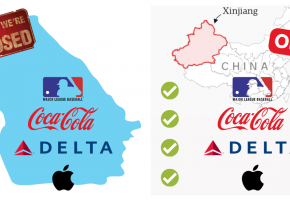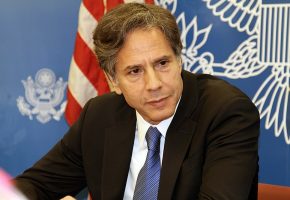China State Media Dunks on NBA, Warns About Future
The final days of the NBA season were eventful: The Los Angeles Lakers won the championship and the Chinese Communist Party allowed Game 5 to be broadcast on CCTV. Both were victories for the beleaguered sports league — the legendary franchise’s return to dominance and a return to the biggest global market.
But the complexities with China are far from over. The Communist nation’s state media has recently issued warnings about the future of the relationship. Days after the season concluded, Daryl Morey, the NBA executive whose tweet in support of Hong Kong’s freedom protesters triggered the rift with Beijing, “stepped down.” The timing of the personnel move with the resumption of broadcasting was noted by the American media as suspicious. The Chinese state press apparatus celebrated and mocked Morey’s departure while inferring that he had paid a price for his relatively innocuous social media post.
In response to the news of a playoff broadcast restoration — before Morey had stepped down — The Global Times, China’s most hawkish media mouthpiece, quoted a “market observer” who told the outlet: “There is an old Chinese saying that it’s never too late to mend. The NBA has a wide fan base in China. However, the doors to further access the Chinese market, and whether the organization could further tap into the market, still depend on their performance in the future.”
While welcoming the league back into the market, an unnamed spokesperson announced “we have also noticed the goodwill expressed by the NBA for some time, especially since the beginning of this year.” As tensions grew, superstar athletes refused to criticize the Xi regime, with some going so far as to proclaim that “we love China.” The league itself booted fans from arenas who expressed support for Hong Kong freedom protesters at games. In June, NBA Commissioner Adam Silver vaguely alluded to an improving relationship with the Communist regime, but was short on details.
The broadcast suspension had clearly taken a financial toll on the NBA, which has been previously reported to have cost them hundreds of millions of dollars. The league was also subject to taunts in Chinese state media this spring that suggested the moves they were making were “not enough” to repair the relationship. The Wall Street Journal reported that the NBA had hoped that the punishment would be alleviated by the All-Star festivities earlier this year, but notes that “CCTV aired figure skating instead.”
The NBA season concluded with a historic ratings collapse in the United States, a fact that the Chinese state media played up in a column congratulating the Lakers on their championship. A Global Times author wrote that “China News Service indicated that the NBA’s annual net profits were about $1.8 billion, of which China contributed as much as $200 million, accounting for 10 percent” and added “a regular-season game in the 2018/19 season in China can attract 7 million viewers on average, but only 3.8 million in the US, said the Shanghai Observer.”
These state media economic reminders and the warning about future market expansion in China put the NBA in a continually volatile situation. As the season wound down, franchise owner Mark Cuban found himself in a contentious conversation with podcast host Megyn Kelly. As Variety headlined the exchange, “Mark Cuban condemns China on human rights but avoids specifics at delicate time for the NBA.” During the playoffs Jazz star Rudy Goebert “became the first NBA player to publicly protest” in support of the Uighur persecution and mass internment. While those comments may have irritated the Xi regime, a recent development with the Houston Rockets franchise may overshadow episodes like those to the league’s benefit.
On October 15, the Houston Rockets announced General Manager Daryl Morey was stepping down. ESPN reported that the NBA executive “has become increasingly determined to explore what else might interest him professionally.”
The Chinese government had previously demanded that Morey be fired. CCP press had made it a point to villainize him throughout the saga, at times citing social media users who were “urging the club to punish Morey.” In one CCP state media article announcing the return of the NBA finals to CCTV Morey is mentioned three times by name and referenced in the headline.
Upon news of his departure, it was reported by AFP that “China state broadcaster hints NBA executive Morey ‘paid price’ for Hong Kong tweet.” That report also highlights that CCTV “used a phrase that in Chinese is usually reserved for people who have died.”
The day after his resignation, the giddy Global Times published an article titled, “Sports fans rejoice over Morey’s resignation as he ‘obstructed NBA’s ties with China’” that blended celebration with mockery and further threats to the league. They write that online citizens were speculating about whether “dismal business results of the NBA amid the pandemic and pressure from NBA senior personnel might have been reasons for Morey’s resignation.” However, they claim that “NBA China told the Global Times on Friday that they would not comments (sic) at the present time.” The CCP rag twisted the knife further by adding “Morey may indeed want to explore what else might interest him professionally, his role in exposing the importance of the Chinese market for the NBA still factored into the decision, US media reported.”
The column ends with analysis from a Beijing-based sports commentator, Wang Dazhao, who stated that “Chinese NBA fans should not assume that Morey’s resignation will immediately promote exchanges between the US and China, despite CCTV showing its sincerity in its recent decision to resume broadcasting of the NBA finals before Morey’s resignation.” Wang references the economic turmoil that resulted from the broadcast banishment in the era of Covid-19: “the NBA had temporarily lost the Chinese market, and thus incomes of teams and players were affected accordingly.” He concludes with this consideration about the future: “If the whole NBA behaves like Morey, openly discussing the internal affairs of other countries, is the NBA a sports league that promotes cultural exchanges?”



